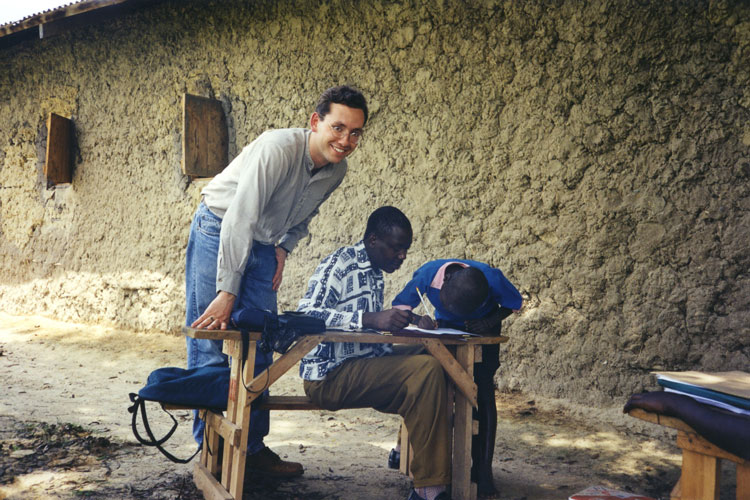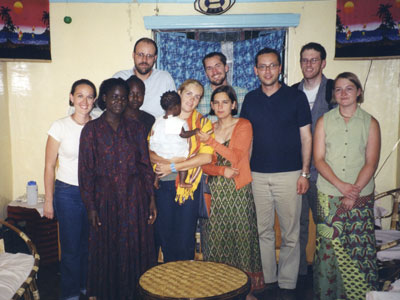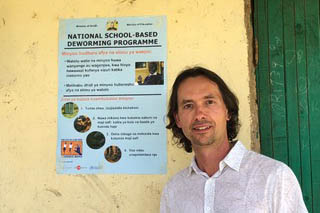Economist Ted Miguel awakens to Nobel Prize dream — well, almost

UC Berkeley economist Ted Miguel awoke before dawn on Monday, Oct. 14, to the buzzing of dozens of texts and emails. As he blearily scanned his smartphone, a scenario that virtually every scholar and scientist dreams about gradually came into focus.
Not only had Michael Kremer, his former Ph.D. adviser at Harvard University, won the 2019 Sveriges Riksbank Prize in Economic Sciences in Memory of Alfred Nobel, informally called the Nobel Prize in Economics — along with MIT economists Esther Duflo and Abhijit Banerjee — but a Kenyan poverty-fighting project that Miguel and Kremer have worked on since the 1990s was among the groundbreaking research cited in the announcement.
“This is incredibly exciting for me, and for Berkeley,” says Miguel, an economics professor at Berkeley since 2000. “I’m over the moon for Michael (Kremer). He’s a great human being, and I’ve known Abhijit and Esther for years. I feel very connected to them all.”

To recognize Miguel’s contribution to the winners’ “experimental approach to alleviating poverty,” the Royal Swedish Academy of Sciences has invited him to the Nobel Prize award ceremony and banquet in Stockholm, Sweden, in December.
Miguel, 45, is Berkeley’s Oxfam Professor of Environmental and Resource Economics and founder and faculty director of the campus’s Center for Effective Global Action. The center’s work is also recognized in the Nobel announcement.
He is known internationally for his pioneering use of objective measures, such as randomized controlled trials, to test public health, education and other interventions in the field. In addition to Kenya, he has conducted fieldwork in Sierra Leone, Tanzania and India.

In Monday’s announcement, the Nobel Committee lauded Kremer, Duflo and Banerjee for breaking down the daunting problem of global poverty into “smaller, more manageable questions” and, in some cases, through health and educational outcomes in poor countries.
And that’s where Miguel’s work with Kremer comes in.
Since the 1990s, the two have measured the impact of programs combating infections caused by hookworms, roundworms, whipworms and other intestinal parasites that are transmitted to one-quarter of the world’s population.
As part of their endeavor, they tracked more than 30,000 students at 75 elementary schools in western Kenya during a massive, school-based deworming program. They found that those who had been treated were healthier and more likely to attend classes than their peers in schools that were not part of the deworming effort.
All told, the program has been a cost-effective way to boost school participation and led to long-term benefits — not just for the children, but for their surrounding communities.
“We continue to study those same participants, who are now adults in their early 30s, and our 20-year follow-up results show that their earnings and living standards are up to 10 percent higher than if they had not been dewormed,” Miguel says.

The pair’s fieldwork in Kenya certainly came with challenges. In 1998, heavy rains caused by the El Niño weather pattern led to massive flooding in the East Africa, and the researchers had to use canoes to get to many of the schools.
“The roads were flooded out, vehicles broke down and there was a breakdown in sanitation, causing a spike in worm infections, including cholera,” he recalls. “So, the deworming treatment program that we helped to design and study came at an opportune time, when communities were most in need.”
In Nairobi in 2002, Miguel first presented the program, along with Kremer, to World Bank foreign aid and Kenyan government officials, who Miguel recalls were visibly impressed.
“People understood what we were talking about,” he says. “There was so much rigor in the data collection and the design.”
Miguel is delighted, if not somewhat surprised, that development economics is getting the Nobel spotlight this year. Usually, he notes, the committee that awards the 1968-founded prize has favored abstract economic theory or econometrics, the discipline’s statistical branch.
“Development economics, grounded in real data and evidence to solve global problems, is a relatively young endeavor, and so recognition in the form of a Nobel came sooner than I expected,” he says. “Essentially, it seems that this prize is recognizing an ongoing revolution.”
As for what’s next, Miguel expects to convene with Kremer, Duflo and Banerjee next month at a conference in Cambridge, Massachusetts. “Kremer and I are still working together,” he says.
Then, in December, he and his wife will attend the 2019 Nobel Prize award ceremony and banquet in Stockholm, where the dress code for ladies is an evening gown, and for gentlemen, a white tie and tails.
“That’s not something I have in my closet right now,” Miguel quips.
